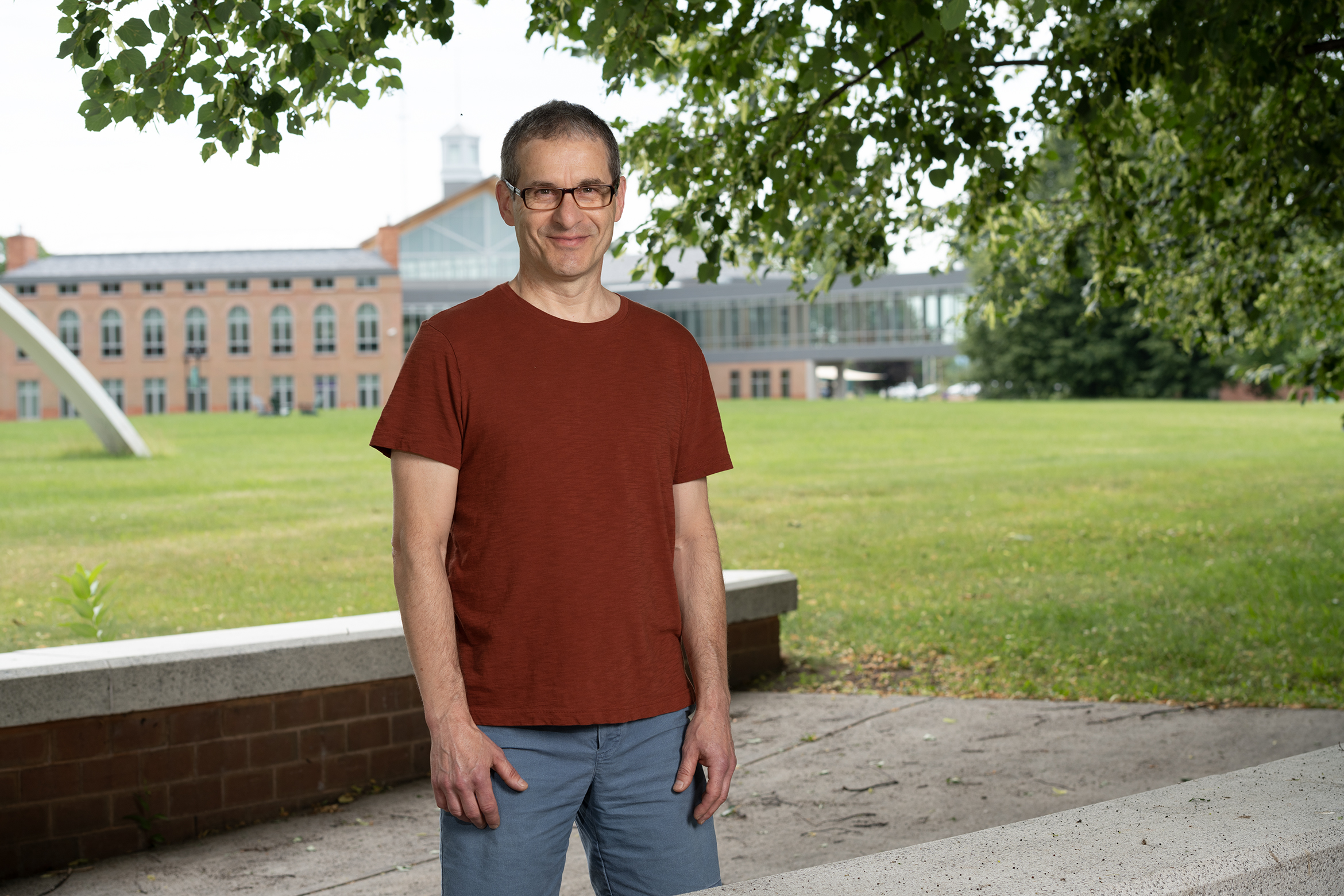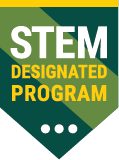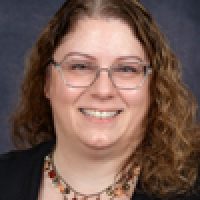Earn Your Graduate Degree in Computer Science
Develop the Future of Computer Technology
The modern economy is powered by computer technology. From something as simple as a computer file to the quick developments in AI-generated text, computer scientists are pushing the boundaries of what is possible.
An MS in Computer Science from Clarkson University gives you the skills to be at the forefront of innovation. Our rigorous program goes beyond the fundamentals, so you can explore the latest advances in artificial intelligence, cybersecurity, virtual reality, quantum computing and more. By the time you graduate, you will have the specialized expertise to become a leader in the industry or pursue additional original research in a PhD program.
A PhD in Computer Science from Clarkson University can help you become a lead researcher in academia, government agencies, the tech sector and other growing industries. Become an expert in artificial intelligence, cybersecurity, virtual reality, quantum computing and other innovative developments in computing. Devote your studies to developing original, innovative research that can propel the field forward. This is the opportunity to make an impact on society through computer technology. Coursework can be completed on our Potsdam campus or online.
Why Earn an MS in Computer Science From Clarkson University?
Considered one of the best graduate computer science programs by U.S. News & World Report, our curriculum is designed to be tailored to your goals. You can complete the degree onsite or online, and you can either develop a thesis or select a professionally oriented non-thesis track.
Whatever path you take, you will benefit from our small department. Our faculty mentors give you the personal attention you need to fulfill your studies. The program is offered by both the Department of Electrical & Computer Engineering and the Department of Computer Science and has an interdisciplinary focus. We encourage collaboration and teamwork as you go through the program.
The department focuses on the wide spectrum of artificial intelligence capabilities, including automated reasoning, computer vision, machine learning, virtual reality, robotics, human-robot interaction and the social implications of AI. Other areas of expertise include cybersecurity, virtualization, natural language processing, human-computer interaction, quantum computing and computational complexity.
In addition to our state-of-the-art facilities, you will have access to our award-winning Career Center. Clarkson has strong connections to the industry, which helps open the door to various career opportunities for our students.
Request Info


What You'll Learn
The MS in Computer Science requires a minimum of 30 credit hours of graduate-level work. All students take the foundation course, Computer Algorithms, and six credit hours of programming-intensive courses. The remaining credits will be rounded out by electives and a thesis project, should you choose to do one.
Some of the courses we offer include:
|
|
|
|
|
|
|
|
|
|
|
|
|
|
|
Curriculum
Computer Science Degree Requirements
In addition to the general requirements for the MS degree that are established by the University, students must satisfy the following set of requirements:
- The program requires a minimum of 30 credit hours of graduate level work. At least 20 credit hours must be earned in residence at Clarkson. Each student’s program of study must be approved by an advisory committee.
- Students who are not fully prepared to pursue graduate work in computer science may be required to take the course CS511 Foundations in Computer Science. In addition, students with very little or no background in computer science may be required to take undergraduate computer science courses, for which graduate credit will not be given.
- Two options are available for the MS in Computer Science, thesis-based and project-based. Below is a side-by-side comparison of the programs.
Elective Courses
Includes programming courses, if not used to meet the programming-intensive course requirement.
|
|
|
|
|
|
|
|
|
|
|
|
|
|
|
|
|
|
|
|
|
|
|
MS in Computer Science Thesis Option - 30 Credits
Foundation course – 3 credits
- CS547 Computer Algorithms
Programming-intensive courses – choose two, 6 credits
- List includes courses in machine learning, deep learning, software design and development, computer vision, image understanding, computer graphics, human-computer interaction, mixed reality, and operating systems.
Advisor-approved electives – choose three, 9 credits
- 1 research-focused course in Computer Science
- 1 Computer Engineering course relevant to Computer Science
- 1 Computer Science elective course
Seminar – 2 credits
Thesis – 10 credits
MS in Computer Science Non-Thesis Option - 30 Credits
Foundation course – 3 credits
- CS547 Computer Algorithms
Programming-intensive courses – choose two, 6 credits
- List includes courses in machine learning, deep learning, software design and development, computer vision, image understanding, computer graphics, human-computer interaction, mixed reality, and operating systems.
Advisor-approved electives – choose five, 15 credits
- 1 Computer Engineering course relevant to Computer Science
- 4 Computer Science elective courses
Project – 6 credits
PhD in Computer Science
University Requirements:
- A minimum of 90 credit hours earned for graduate courses numbered 500 and higher, including at least 36 credit hours of classroom and instructional laboratory coursework (this is above the university minimum of 24)
- A minimum of 6 credit hours of research seminar.
- A maximum of 30 credit hours of graduate transfer credit from an MS degree with grades of a B or higher may be accepted toward the PhD degree.
- At least three full academic years of study beyond the baccalaureate degree.
- A cumulative GPA of 3.0 in courses used to meet graduation requirements.
- Graduate students must complete the PhD candidacy procedure within two years of full-time study after admission to the PhD program.
- Doctoral candidates must complete an original research project submitted as a written thesis to be orally presented and approved before a committee of at least five faculty members. At least four members must be Clarkson faculty, of assistant professor rank or higher, and possess a doctoral degree. At least one committee member must be from a department other than the candidate’s major department. An external examiner with appropriate credentials from outside the university may serve as one of the five committee members. The thesis must also be approved by the dean of the graduate school and a copy deposited in the university library.
- All work for the PhD degree must be completed within seven years after admission to candidacy.
Additional Program Requirements and Procedures
Coursework:
Students must complete a minimum of 36 credits of computer science-related coursework, including the following:
Foundations. Students must take four required courses across three areas: CS541 (theory), CS547 (theory), CS544 (systems) and CS545 (languages). A grade of B+ or better is required in each of these courses. A written exam option is offered for students who have taken equivalent courses at other institutions and for students who did not receive a B+ in the Clarkson course. Students who have taken equivalent courses at other institutions and pass the exam with a grade of B+ or better can replace the corresponding course with another CS course.
Research-Oriented Courses. Students must also complete a minimum of four 3-credit research-oriented 600-level CS courses. Research-oriented courses include a substantial research literature review and a research project/presentation component. The Computer Science PhD Committee will maintain a list of acceptable research-oriented courses. The 600-level CS Directed Study Courses are acceptable by permission of the Computer Science PhD Committee only when such courses satisfy the same standards as regular 600-level CS courses and include a substantial research literature review and a research project/presentation component. A grade of B+ or higher is required in two 600-level CS courses in order to advance to candidacy, and one of these must be a research-oriented 600-level course.
Breadth Requirement. Beyond the four required courses listed in Foundations, students must take one course from each of the following four groups. Courses used to satisfy this breadth requirement may also be used to satisfy the research requirements. The specific lists of courses may change, and students may petition the Computer Science PhD Committee to accept additional courses, including courses outside the department, in these groups:
- Group A (theory and algorithms): 542, 546, 549, 556, 642, 656
- Group B (computer systems and networks): 553, 555, 557, 563, 644, 654
- Group C (languages and software development): 543, 550, 558, 560, 658
- Group D (artificial intelligence and applications): 551, 552, 559, 561, 562, 659
Electives. Students must take additional courses as necessary to reach 36 course credits. Students are expected to take at least one graduate course in computer science or a related field each semester that they are enrolled in the computer science PhD program. This requirement may be waived in consultation with the student’s advisor or if the Computer Science PhD Committee decides it is in the student’s best interest to focus on completion of the thesis work.
Seminar. Students are required to attend and participate in the CS707 or 708 Seminar in Computer Science (1 credit) series during at least six semesters in residence in the PhD program. Participation is recommended during each semester in residence in the PhD program.
Candidacy. The doctoral candidacy procedure for the computer science program is portfolio-based.
Before advancing to candidacy, students must have completed the four required courses (CS541, CS547, CS544 and CS545) and two of the 600-level CS courses, at least one of which must be a research-oriented course. A grade of B+ or higher is required in each course.
Students prepare a portfolio consisting of a written statement of research interest and representative work from courses and seminars (e.g., exams, research papers, presentation materials). Student appear before the Computer Science PhD Committee for an oral defense of their portfolio. This oral defense and portfolio examination constitutes the comprehensive exam for candidacy in computer science.
To advance to candidacy, students must have also chosen a faculty advisor who believes they are prepared to begin original research in a mutually acceptable field of specialization.
Students must advance to candidacy within two years of full-time study after admission to the PhD program or be granted an extension by the Computer Science PhD Committee.
Thesis Proposal. Students must write a thesis proposal outlining their research plan and discussing related work and defend this proposal in an oral exam before the thesis committee.
In addition to the university requirements, at least three members of the committee must be from the Department of Computer Science.
Students must form their committee and pass the thesis proposal defense exam by the end of their third year of full-time study after admission to the PhD program or be granted an extension by the Computer Science PhD Committee.
Thesis Defense. The final step in completion of the doctoral program is the submission of a written thesis in conjunction with an oral thesis defense.
Candidates will normally present a 50-minute oral presentation of the thesis work at an advertised campus event followed by at least 10 minutes of public questions. After the end of the public session, candidates and their five-member thesis committee will gather in a closed session for final questions and presentation of corrections to thesis. Candidates will be then asked to leave the room for a final vote of approval. Following approval, candidates must complete the requested corrections to the written thesis and obtain final signatures. Candidates must provide all five thesis committee members with a copy of the thesis at least four full weeks before the public defense.
The thesis committee for the final defense is the same as that for the proposal defense. Any changes must be approved by the Computer Science PhD Committee in advance of the final defense.
Research
Solving real-world problems based on cutting-edge research is at the core of what we do. Our 18 research centers and laboratories include the Biomedical Signal Analysis Laboratory, the Clarkson Center for Complex Systems Science, and the Smart Power Systems and Controls Lab. We also count more than 380 partners in industry, government agencies, chambers of commerce and research organizations also offer graduate students a wealth of opportunities to continue doing their important work.
Distinguished Faculty
Our faculty are recognized as leaders in their respective fields and are at the helm of cutting-edge projects. They collaborate closely with each other to provide innovative solutions for complex problems. Our faculty members also value the talents of students and serve as active and engaged mentors.
Admission Requirements
A completed application consists of the following:
- Online Application Form.
- Résumé.
- Statement of purpose.
- Three letters of recommendation.
- Official transcripts.
- GRE test scores.
- Required. Waivers will be considered.
- For international applicants, an English proficiency test is required.
- Minimum test score requirements: TOEFL (80) and TOEFL Essentials (8.5), IELTS (6.5), PTE (56) or Duolingo English Test (115).
- The English language-testing requirement is not waived based on language of instruction, nor do we accept university certificates. English testing is waived if an applicant has a degree from a country where English is the Native Language. Click here to see the list of these countries.
Prerequisites: A BS or equivalent degree in computer science or another closely related subject. Admission to the computer science program depends upon the Computer Science Graduate Committee’s approval.
Career Possibilities
Professionals in computer science are in high demand and will continue to be for quite some time. According to the U.S. Bureau of Labor Statistics, job prospects in the field are expected to grow much faster than average over the next decade. Graduates can expect to find opportunities in a wide variety of industries or choose to pursue further studies through a PhD program.
Some of the roles you might consider after MS include:
|
|
|
|
|
|
|
|
|
|
Some of the roles you might consider after PhD include:
|
|
|
|
|
Recent Employers
The U.S. Bureau of Labor Statistics estimates 15 percent more computer science and information technology positions through 2031. Through the edge given by an MS in Computer Science, our students have started positions or advanced their careers with:
- Axiom Cloud
- Kitware Inc.
- Nine Hill Technologies
- Vanteon Corporation
- Department of the Air Force
- LMI Technologies
If you are interested in learning more, have questions or are ready to apply, contact:

Doreen Morris
Graduate Recruiter
Clarkson University
dmorris@clarkson.edu
518-631-9840